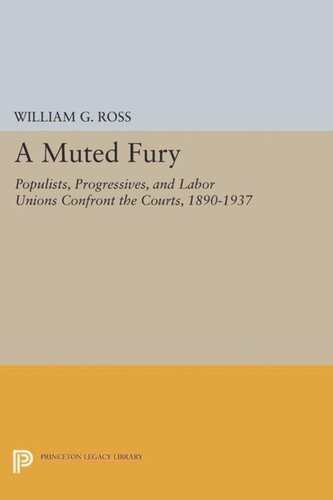

Most ebook files are in PDF format, so you can easily read them using various software such as Foxit Reader or directly on the Google Chrome browser.
Some ebook files are released by publishers in other formats such as .awz, .mobi, .epub, .fb2, etc. You may need to install specific software to read these formats on mobile/PC, such as Calibre.
Please read the tutorial at this link: https://ebookbell.com/faq
We offer FREE conversion to the popular formats you request; however, this may take some time. Therefore, right after payment, please email us, and we will try to provide the service as quickly as possible.
For some exceptional file formats or broken links (if any), please refrain from opening any disputes. Instead, email us first, and we will try to assist within a maximum of 6 hours.
EbookBell Team

4.8
94 reviewsFor half a century before 1937, populists, progressives, and labor leaders complained bitterly that a "judicial oligarchy" impeded social and economic reform by imposing crippling restraints on trade unions and nullifying legislation that regulated business corporations. A Muted Fury, the first study of this neglected chapter in American political and legal history, explains the origins of hostility toward the courts during the Progressive Era, examines in detail the many measures that antagonists of the judiciary proposed for the curtailment of judicial power, and evaluates the successes and failures of the anti-court movements.
Tapping a broad array of sources, including popular literature and unpublished manuscripts, William Ross demonstrates that this widespread fury against the judiciary was muted by many factors, including respect for judicial power, internal divisions among the judiciary's critics, institutional obstacles to reform, and the judiciary's own willingness to mitigate its hostility toward progressive legislation and labor. Ross argues that persistent criticism of the courts influenced judicial behavior, even though the antagonists of the courts failed in their many efforts to curb judicial power. The book's interdisciplinary exploration of the complex interactions among politics, public opinion, judicial decision-making, the legislative process, and the activities of organized interest groups provides fresh insights into the perennial controversy over the scope of judicial power in America.
Originally published in 1994.
The Princeton Legacy Library uses the latest print-on-demand technology to again make available previously out-of-print books from the distinguished backlist of Princeton University Press. These editions preserve the original texts of these important books while presenting them in durable paperback and hardcover editions. The goal of the Princeton Legacy Library is to vastly increase access to the rich scholarly heritage found in the thousands of books published by Princeton University Press since its founding in 1905.